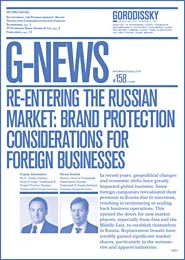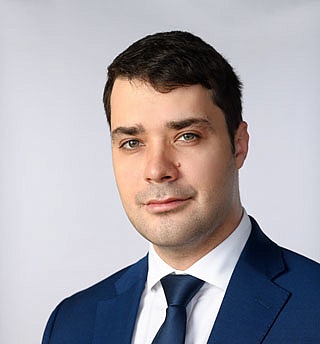Pharmaceutical Trademarks 2021 Chapter Russia
11 December 2020OVERVIEW
Legislation
1 What is the primary law governing trademarks in your jurisdiction?
The primary law governing trademarks in Russia is the Russian Civil Code Part IV effective since 2008.
In addition, Russia is a party to international treaties such as:
- the Madrid Agreement concerning the International Registration of Marks 1891–1967;
- the Protocol relating to the Madrid Agreement of 1989 concerning the International Registration of Marks;
- the Nice Agreement concerning the International Classification of Goods and Services for the Purposes of the Registration of Marks (Nice Union) 1957–1977;
- the Paris Convention for the Protection of Industrial Property;
- the World Trade Organization Agreement on Trade-Related Aspects of Intellectual Property Rights 1994 (the TRIPS Agreement);
- the Trademark Law Treaty 1994; and
- the Singapore Treaty on the Law of Trademarks 2006.
Furthermore, Russia, as a member of the Eurasian Economic Union (EAEU), also participates in the regional developments aimed at unification of trademark provisions across Eurasia – on 3 February 2020, the EAEU signed in Moscow the EAEU treaty on trademarks, services marks and geographical indications that introduced new unified Eurasian trademarks.
Agencies
2 Which agency is responsible for the grant and registration of pharmaceutical trademarks?
The Russian Federal Services of Intellectual Property (commonly known as Rospatent or the Russian PTO) is the governmental agency responsible for granting and registering pharmaceutical trademarks.
Regulators
3 What are the relevant national and international regulatory bodies and requirements that need to be considered when clearing a pharmaceutical trademark?
The relevant national regulatory body is the Russian PTO. Furthermore, the Russian Ministry of Health also has competence with regard to the designations that are used as ‘trade names’ of the medicines – irrespective of whether such designations are registered trademarks or not.
With regard to clearing pharmaceutical trademarks, the following basic requirements need to be observed:
- the designation shall have a distinctive nature;
- trademarks shall not mislead consumers;
- trademarks shall be identical to the international non-proprietary names; and
- trademarks shall not be identical or confusingly similar to earlier trademarks, firm names and commercial designations.
Furthermore, Federal Law 12 April 2010 N 61-FZ ‘On circulation of medicines’ registration of:
- different medicines under the same trade name; and
- the same medicine seeking registration by the same applicant in the form of two or more medicines under different trade names.
Non-traditional trademarks
4 What non-traditional trademarks are available in your jurisdiction and how are they registered?
Russian law has no limits on any non-traditional trademarks – thus any designation that may individualise products or services can be registered as trademarks, meeting other registrability requirements.
Owing to the nature of pharmaceutical products, brand owners in Russia typically register the name of the medicine (in Cyrillic and as the case might be in Latin characters) as well three-dimensional trademarks covering the appearance of the package or relating to marketing techniques.
Cannabis-derived products
5 Does your jurisdiction allow the registration of cannabisderived products?
The Law on Medicines allow registration of narcotic and psychotropic medicines, whose use is subject to the strict regulatory regime. Cannabis and tetrahydrocannabinol (all isomers and their derivatives) are included into the list of narcotic substances subject to special control. Various initiatives at providing more clarity on the possible use of cannabis-derived medicines are discussed at a regulatory level.
PARALLEL IMPORTS
Regulation
6 What are the rules governing parallel imports of pharmaceutical goods?
Russia sticks to the regional principle of exhaustion of trademark rights – meaning that as such imports are allowed to enter the territory of Eurasian Economic Union (EAEU) member states only on the condition they receive the relevant consent from the trademark owner.
In the context of pharmaceutical products, the provision is narrowed, giving more strength to brand-owners – since imports of the medicine generally require Russian-granted marketing authorisation as well as compliance with various regulatory requirements, such as Russian-language marking and packaging.
Strategies against parallel imports
7 What strategies are available to police and enforce against parallel imports?
Pharmaceutical brands owners are recommended to include their trademarks in the Customs register of Intellectual Property Objects. Such recordation allows the customs offices to regularly stop unauthorised imports and cease the goods.
If the goods are original, but parallel-imported (imported without the consent of the trademark owner), the trademark owner may file for a preliminary injunction and proceed with civil litigation, claiming recovery of compensation as well as destruction of the seized goods under the special circumstances relating to non-compliance of the seized goods with the safety requirements.
If the goods are fake, the Customs themselves proceed with launching administrative proceedings, ending with fines and destruction of counterfeit goods.
ANTI-COUNTERFEITING AND ENFORCEMENT
Types of proceedings
8 What types of legal or administrative proceedings are available to enforce against infringing products?
The trademark owner may proceed with civil (court), administrative (police and anti-trust authority) or criminal enforcement against infringing products.
Remedies
9 What are the available remedies for infringement?
Depending on the proceedings, the trademark owner may have the following remedies:
- preliminary injunction and permanent injunction;
- compensation or damages;
- seizure and destruction of counterfeit medicines;
- publication of the court decision; or
- fines and imprisonment (in administrative and criminal proceedings).
Border enforcement
10 What border enforcement measures are available to halt the import and export of infringing goods?
The Federal Customs Authority has the competence of border control with regard to importation and exportation of infringing goods. In this regard, trademark owners are recommended to record the trademarks in the Customs Register of Intellectual Property Objects.
Online pharmacy regulation
11 What rules are in place to govern online pharmacies?
Following the recent amendments in Russian law relating to covid-19 challenges, online sale of medicines was allowed. Specifically, Federal Law No. 105-FZ ‘On amending article 15.1 of the Federal law of information, information technologies and protection of information and the
Federal law on medicines circulation’ allowed online sale of medicines, with the exception of:
- prescription medicinal products;
- narcotic medicinal products and psychotropic medicinal products; and
- alcohol-containing medicinal products with a volume fraction of ethyl alcohol greater than 25 per cent.
Online pharmacies need to have state permits for pharmaceutical activity and the corresponding permission of the state regulator obtained within the special procedure. Non-compliance with the set requirements will result in blocking the websites that offer medicines.
Recent cases
12 What are the most notable recent cases regarding the enforcement of pharmaceutical marks?
In case А40-45102/10-143-385, the Russian court banned use of the pharmaceutical trademark OCUVITE by local defendants that commercialised biological food additives with the name OCOViT. The case involved the use of a social opinion poll report establishing that the names caused confusion among consumers.
ADVERTISING
Regulatory bodies
13 Which bodies are responsible for oversight of pharmaceutical advertising in your jurisdiction (and what are their powers)?
In Russia, it is the Federal Anti-Trust Service (FAS) and its regional divisions that oversight pharmaceutical advertising in Russia. FAS powers include:
- detection, prevention and termination of breaches of the Advertising Law, as well as initiation and hearing of cases on breaches of the Advertising Law;
- injunctions to advertising participants to stop advertising campaigns;
- lawsuits where advertising is in breach of the Advertising Law, as well as lawsuits on publishing counter-advertising;
- invalidation of permission to place advertising on outdoor constructions; and
- issuing injunctions to state authorities in case local normative acts are in contradiction to the Advertising Law, as well as challenging activities of authorities in courts if they are in contradiction with the Advertising Law.
Advertising rules
14 What specific rules are in place regarding the advertising of pharmaceutical products?
Article 24 of the Advertising Law provides the specific rules for the advertising of pharmaceutical products. The main principle is that the information in the advertising shall not go beyond the scope of the information indicated in the Ministry of Health-approved instruction for use of the medicine and shall not contradict it.
Further, the advertising of pharmaceutical products shall not:
- appeal to minors;
- indicate specific cases of cure or improvement of health (not applied to advertising intended only for medical professionals in specialist publications or events);
- express gratitude by specific individuals (not applied to advertising intended only for medical professionals in specialist publications or events);
- invoke results of obligatory clinical trials or examinations as evidence of any advantages of the drug;
- assert that consumers have certain diseases or health problems;
- create impression that a healthy person should use the drug (not applied to advertising of preventive drugs);
- create the impression that by using the drug it is unnecessary to consult a doctor;
- guarantee favourable effects of the drug, its safety and effectiveness, and the absence of side effects;
- imply that the drug is a biologically active additive or food supplement or any other product that is not a medicine; and
- imply that safety or effectiveness of the drug is explained by its natural origin.
GENERIC SUBSTITUTION
Legality
15 Is generic substitution permitted in your jurisdiction?
As such, generic medicines are allowed for sale if they do not infringe intellectual rights of third parties. In this regard, since, generally, it is the international non-proprietary name that is indicated in the state procurement bids or individual doctor’s prescriptions, generic medicines may be sold.
Regulations
16 Which regulations govern generic substitution by pharmacists of brand-name drugs?
Use of generics is governed by the Federal Law 12 April 2010 N 61-FZ ‘On circulation of medicines’ and related by-laws.
UPDATE AND TRENDS
Key developments and future prospects
17 What were the key judicial, legislative, regulatory and policy developments of the past year in relation to the protection and enforcement of pharmaceutical trademarks? What are the prospects for future developments?
Due to the adoption of the unified pharmaceutical market on the territory of the Eurasian Economic Unions, increased attention to protection of intellectual property, including pharmaceutical trademarks, is observed. The launch of Eurasian trademark as well as continued law enforcement activities aimed at seizure of counterfeit medicines remain the major trend from the regulatory perspective.










